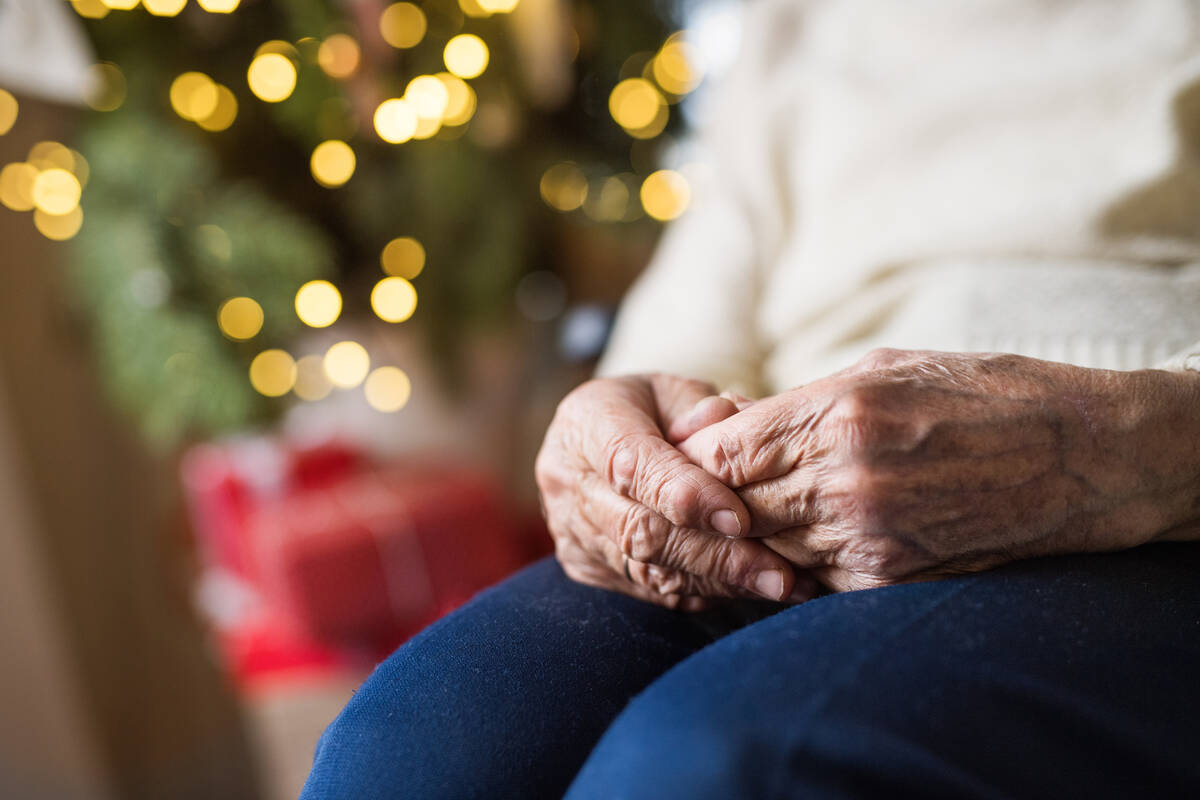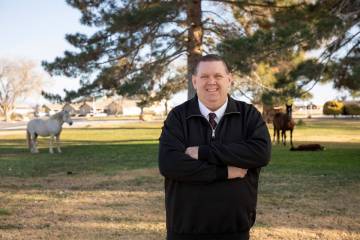Loneliness a hidden health risk for older people, especially during the holidays, experts say
About three weeks ago, not long before the arrival of Thanksgiving and the official start of the holiday season, Dr. David Glenn Weismiller saw a patient with a seasonal sort of complaint.
“She said, ‘I’m so lonely.’ And she started crying,” Weismiller said of the 77-year-old woman who had lost her partner of 40 years.
It’s not the first time that he has heard such a concern from an older patient.
“I have another patient I’ve been seeing for five years,” said Weismiller, a professor in the department of family and community medicine at UNLV’s Kirk Kerkorian School of Medicine. “His wife died earlier this year, and he’s completely helpless. He literally has no one he can turn to now. He has no hobbies, and he’s not interested in volunteering.”
Coping with feelings of loneliness can be a year-around challenge for seniors. But factor in the idealized — and, for most families, wholly inaccurate — image of the holidays, Weismiller said, and the next few weeks can be a particularly painful time for socially isolated seniors.
Health risks
Studies indicate that at least 30 percent of seniors will experience loneliness around the holidays, Weismiller said.
And it’s not merely feeling bummed out by holiday hoopla. According to a 2023 advisory from the U.S. Surgeon General’s office, experiencing a lack of social connection carries a significant risk to health and longevity.
According to the advisory, loneliness and social isolation can increase the risk for premature death as much as smoking up to 15 cigarettes a day. Insufficient social connection is associated with increased risk of disease, including a 29 percent increased risk of heart disease and a 32 percent increased risk of stroke, the advisory said.
The surgeon general also links isolation to increased risk for anxiety, depression and dementia and possibly an increased susceptibility to viruses and respiratory illness.
Snapshots of isolation
For seniors, social isolation can be caused or compounded by such practical concerns as a lack of transportation to community centers and other meeting places, limited finances, and health or lifestyle conditions that may hamper simply getting out of the house.
The surgeon general advisory notes that studies find the highest prevalence for loneliness and isolation among “people with poor physical or mental health, disabilities, financial insecurity, those who live alone, single parents, as well as younger and older populations.”
Of course, being alone isn’t the same as being lonely.
“You can be alone but still have things that help you to complete your life and be engaged,” said Erica Wiggins, vice president for Optum Community Centers in Southern Nevada. According to Wiggins, social isolation involves four factors, which can be identified by the acronym PIES: physical, intellectual, emotional and social.
Programming and services at Optum’s two local community centers focus on those four aspects, Wiggins said. “When one of those is missing, that’s when you see the isolating.”
Social isolation can manifest itself in several ways, she said. A senior may not leave their home or may withdraw from social activities. They may lose or gain weight from following a non-nutritious diet. They also may develop signs of depression or dementia or take up smoking or other unhealthy behaviors.
Or the effects might manifest in seniors not caring for themselves properly, Weismiller said, or with poor hygiene that leads to skin or urinary tract infections. “You cannot separate your mental and physical health,” he said.
Isolation also can make chronic medical conditions more difficult to manage, he added: “You’re not going to be attuned to managing your blood pressure if you can’t get out of bed.”
How well someone copes with social isolation depends in part on skills and resources they have in place, said Carl Bahr, social work manager for Optum Community Centers.
“We come across many people who describe themselves as loners, but a loner is not just being alone,” he said, adding that someone might start off “independent” but find that they are not as self-sufficient as they thought.
Holiday blues
The holiday season’s emphasis on family and friends may make this time of year even harder on seniors.
While isolation is a year-around problem, the holiday season can make it feel more pronounced, especially with such later-in-life changes as spouses passing and children moving away.
Weismiller tells seniors, first, “It’s OK to feel lonely, to experience that.”
Then, he said, ignore all of the unrealistic depictions of the holidays.
Instead, think of activities that bring personal joy and calm. Weismiller said his patient, for example, enjoys travel and shopping, and he suggested that she work them into her season.
Also, make a deliberate effort to connect with other people. Community centers, gyms, libraries, classes and social events can be good places for seniors to interact with others.
With its usual roster of classes and programs, Optum’s community centers offer holiday-themed activities, and all are open to everybody who “considers themselves older adults,” Wiggins said.
Classes, programs and senior-focused activities offer a way for seniors to meet and interact. Bahr said seniors at Optum centers have told him that activities there were “a lifeline” in getting them out of the house.
Keep at it
For Lee Arnstein, the important thing is just making an effort. He and his wife, Henny, 77, have lived in Las Vegas for 37 years and fill their weeks with activities of all sorts.
They go out “every single day to do something,” Henny said, including attending activities at an Optum community center five days a week.
“I think, staying at home every day, you stagnate,” said Lee, 84, who’s retired from a career editing trade publications. “Just going out makes a difference.”
They make a point of reading fliers and free senior magazines to find things to do and have found libraries a good place to take classes and meet others.
Another option is volunteering.
“It’s tried and true: Help yourself by helping others,” Weismiller said. “Everybody is looking for help during the holidays.
“It’s good to be around people who don’t have anyone. It can give you a sense of belonging. I think if you have that ability to connect, you’d be amazed how many people are looking for the same thing.”
First steps
Libraries, churches and city and county facilities and agencies all offer senior-friendly programs and activities this time of year, said Erica Wiggins, vice president for Optum Community Centers in Southern Nevada.
Nevada 211 (also available at nevada211.org), a phone- or web-accessible clearinghouse of services for Nevadans also can provide information about activities and programs, Wiggins said.
"There are all sorts of resources across the Las Vegas Valley, she said, "but I'd say the majority of people … just don't know we exist."
Carl Bahr, social work manager for Optum Community Centers (optumnv.com/community-centers), said the centers — at 5820 S. Eastern Ave., Suite 100, and 8670 W. Cheyenne Ave., Suite 105 — are open to all seniors.
Bahr also suggests that libraries can be a great resource for classes and activities.
For seniors seeking volunteering opportunities, "I always recommend volunteering with nonprofits," Wiggins said. "We've found (seniors) really enjoy it and like to contribute and have a positive impact on the community."

















